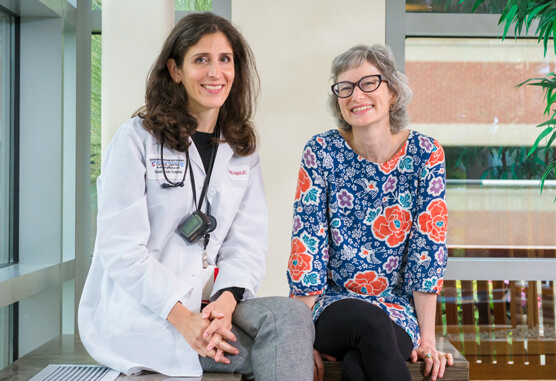Being diagnosed with breast cancer can be extremely difficult for a woman of any age, but it can be even harder for those who are younger.
Here are six important things to know if you’re a young woman who has been diagnosed with breast cancer — including how to get support, and some answers to some common questions.
There are a multitude of support options for young women with breast cancer.
Dana-Farber offers a wide variety of different support options to help young women cope with the difficulties of treatment and life after treatment. It is important to remember that you are not alone, and you do not have to go through this alone. Dana-Farber has created a network of dedicated people that are ready and willing to be part of your support system.
Below are some links to help you learn more about the different support options that Dana-Farber offers and how to get involved. (Note that some programs require you to be a patient at Dana-Farber in order to participate.)
- Young and Strong Program for Women with Breast Cancer
- Adult Social Work Program
- Support Groups and Seminars
- SoulMates
- Young Adult Program (YAP)
- The Leonard P. Zakim Center for Integrative Therapies and Healthy Living
Treatment varies for each woman — and you have options.
Treatment for breast cancer depends on the type and stage of the cancer. It generally includes surgery, and may also include radiation therapy, hormonal therapy, and/or chemotherapy. Certain treatments are more effective against particular types of breast cancer and a woman’s treatment plan will be tailored to the type and stage of breast cancer that she has.
Many young women with cancer in one breast think that removing both breasts with a bilateral mastectomy will improve their chance at long-term survival. There are some situations where a bilateral mastectomy may be needed, but for most people, removing the tumor with a lumpectomy, followed by radiation therapy, can be equally as effective and much less invasive.

Breast cancer treatment can affect fertility, but there are steps you can take.
Fertility can be a difficult issue to think about, but it is important for young women to discuss it with their care team prior to beginning treatment.
Chemotherapy is a common treatment for breast cancer, but it can have negative effects on a woman’s reproductive system. Young women who are treated for breast cancer with chemotherapy may have a harder time becoming pregnant due to chemotherapy-related damage to the ovaries. This risk depends on the woman’s age and their specific treatment. For women who wish to preserve their fertility, there are options available, such as freezing their eggs or embryos, to improve the chances of having children after treatment.
Genetic testing can help you and your family members discover who is at increased risk of breast cancer, and how to deal with that risk.
While breast cancer is a common issue, family history and certain genetic mutations can lead to a woman being at higher risk for developing breast cancer. Genetic testing can help to determine how at risk a woman is for developing breast cancer.
It is recommended that all young woman receive genetic testing, but women who have a family history of breast or ovarian cancer or a family member with a mutation in the BRCA1 or BRCA2 gene are at increased risk and should speak to their physician about getting tested.
The results of the test can help make decisions about when, how, and how often women and their family members are screened for breast cancer and other cancers. The results can also be used to determine whether or not medical or surgical risk-reducing strategies make sense.
Maintaining a healthy routine is important.
Maintaining a healthy diet and exercise routine will keep the body healthy and in top fighting form. A healthy body can make recovery from treatments a bit easier as well as help keep cancer recurrences after treatment at bay. Eating a healthy diet and getting regular exercise is also good advice for living a long happy life outside of its impact on cancer recurrence.
Keep up with age-appropriate screenings.
Getting regular mammograms (depending on the woman’s age) is an important preventative step as they can help detect breast cancer or recurring breast cancer early, which can make treatment easier. The current guidelines on how often woman should receive a mammogram are:
- Women between the ages of 40 and 44 should have the choice on whether or not to start yearly breast cancer screening with mammograms at this age.
- Between the ages of 45 and 54, a woman should be getting mammograms every year.
- Women who are 55 and older can switch to getting mammograms every two years or they can continue getting screened every year.
Keeping up with screenings is just a good way to make sure you are staying healthy.
About the Medical Reviewer

Dr. Poorvu received his medical degree from the University of Pennsylvania in 2012 and went on to complete his residency in internal medicine at the Brigham and Women's Hospital. He is a medical oncologist in the breast Oncology Center and has a particular interest in the care of young women with breast cancer and breast cancer survivorship. His research seeks to better understand the impact of cancer treatments on fertility and a number of other survivorship issues. Dr. Poorvu's research is also focused on the use of genomic risk prediction assays and predictive biomarkers to help guide the management of breast cancer patients.
